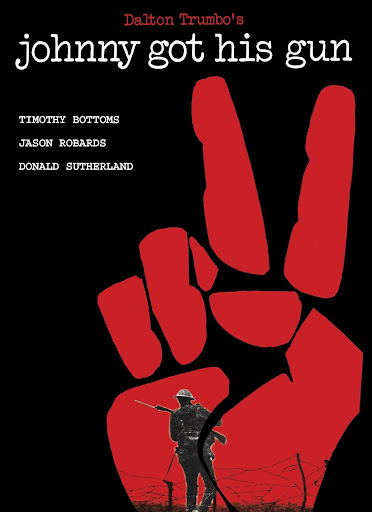(Content warning for topics such as war, fates worse than death, and severe injury. This review does not contain ending spoilers.)
Albeit in the horror genre, Johnny Got His Gun is less an outright scary experience than it is an extremely heavy one. Written and directed by Dalton Trumbo and based on his 1938 novel of the same name, the 1971 film forces us to bear witness to the ugliest potentials of the human experience that most would prefer to turn a blind eye to.
Set during World War One, twenty-year-old American soldier Joe Bonham (Timothy Bottoms) is hit by an artillery shell while in the trenches and later awakes in a hospital. Slowly, he figures out that his face and limbs are gone, essentially reducing him to just a conscience in his bed, unable to act on any of his thoughts. As he lays there for months on end in the dark hospital room, he begins to see visions in his sedative-induced unconscious; people from his past before the war float in and out of his mind, creating blends of his memories, dreams, and fantasies.
The premise of this film alone is horrifying; to be in this state, trapped in your own body with only your mind to keep you company, is utter torture. Through his memories and dreams, we see the life that the man had before he was sent to war. For example, he had a girlfriend who begged him not to go in fear of him losing his life and a somewhat troubled but still-caring relationship with his father; he even had fellow young soldiers as acquaintances. He was an important man to his family and friends with a life and goals for his future- but now, he can’t even contact anyone he knows, and his goals are forever out of reach.
What may be even more horrifying is the way Joe is treated after his injury. Though he’s kept alive through breathing and feeding tubes, with a cover over his head to obscure his gruesome injuries, it has been ordered by the military to keep the man’s condition a total secret. His loved ones know nothing about his state, and are never seen in the film outside of his dreams; he’s not even allowed the privilege of feeling sunlight from an open window.
Joe’s gruesome fate and treatment are all intended to imprint a strong message on the viewer; Johnny Got His Gun is a condemnation of war and a highlighting of the horrors it entails. The film, based on the book written in response to the First World War, critiques the glorification of war in American society and asks you to look at what war causes for those involved. Joe’s fate implores you to think about the fates of the millions of young men sent out to fight for the country instead of simply reducing them to statistics or weapon fodder.
The fate-worse-than-death setup of this film is somewhat similar to other dark stories critiquing the military-industrial complex and the nature of war from the 20th century, such as Harlan Ellison’s famous short story I Have No Mouth, and I Must Scream. However, that didn’t make the movie feel generic. Johnny Got His Gun carries itself superbly with its tone, excellent acting, and artistic choices; for example, it chooses to keep Joe’s real, present life in black-and-white while having his dreams in full color, creating a fascinating visual and symbolic contrast to the freedom of his imagination and the imprisonment of his paralyzed body. Every artistic choice is intended to hit you like a gut punch- and it succeeds.
I interviewed Nether Hicks, the friend who personally recommended this film to me, about their thoughts.
What makes Johnny Got His Gun resonate with you?
Hicks: It has a different narrative than most movies. It has flashbacks that tell his backstory while his real story is going on. It shows how, in real-time, he says that he’s experiencing these memories, and it’s telling the main story at the same time. So it’s like, we’re not quite experiencing exactly what the character has going on, but we can get a feel. And also, the story doesn’t resolve itself- it leaves on a cliffhanger. And I really liked that.
Who do you think the film was made for? What do you think the film’s talking about in real-life terms?
Hicks: I definitely think it’s against war, and it’s definitely denouncing, or trying to un-glorify war. (Joe) was like, ‘I need to go to war and sacrifice myself for the country,’ and everything, but then he went and did that, and…
So you think it’s a criticism of the American attitude around war? And so you’d say it’s directed at people who buy into that attitude?
Hicks: Yeah.
Do you think this film’s message is as relevant now as it was when it was made?
Hicks: I believe so. Because, I mean, war still exists, obviously, and I feel like people still think about war similarly both back then and now.
Heavy-hitting and thought-provoking, Johnny Got His Gun is not for the faint of heart. Above all, its disturbing nature is built to make you reconsider things you previously never questioned and think about what happens to individuals behind the scenes of battle. Available for free on Tubi, PLEX, Amazon Prime Video, and The Roku Channel, this movie is an excellent choice for anyone who wants a truly haunting experience from an older film.







Emily Dykes • Feb 26, 2024 at 11:05 am
Very interesting review! You’re the daughter and sister of military veterans. I wonder if that affected your view of this movie.